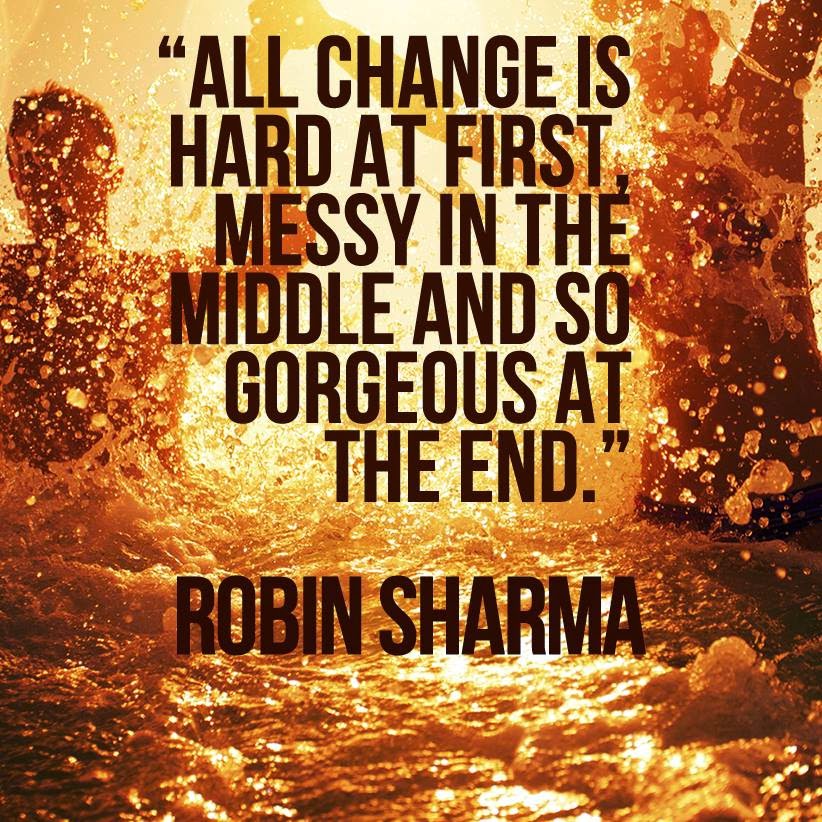“To deal with all government
departments especially BMC (Bombay Municipal Corporation) is a pain in the **s. You put in all efforts and nothing gets done”, said one of the non-profit
founders I recently spoke to and truth be told it won’t be entirely wrong
to say so.
There is endless red tape and white paper you need to go through before things even start moving. Many a times I find myself irritated and depressed by the slow pace and the amount to effort needed to get even ‘little’ changes done. But then I am reminded of the fact that Transformation is a SLOW and PAINFUL process.
There is endless red tape and white paper you need to go through before things even start moving. Many a times I find myself irritated and depressed by the slow pace and the amount to effort needed to get even ‘little’ changes done. But then I am reminded of the fact that Transformation is a SLOW and PAINFUL process.
We humans by
nature love inertia. So why bother to change at all? And WHY change when you can
keep going without anyone questioning you.…But it is this tough job that CACR has taken on…We are NOT here
to CIRCUMVENT the existing system and create parallel structures but we are
here to strengthen the existing one and make it more robust by initiating
key changes.
It
obviously is a long, persistent, and yes at times painstaking process that involves--
countless follow ups, cajoling and at times coaxing the authority to listen to
our point of view to become efficient and accountable (when they don’t have to).
As Emily Griffin said ‘Change can be good but it’s always tough to let go of the past’ and here we are talking about transforming an age-old department that is famous for being corrupt and slow. In my personal experience over the past 3 years of dealing with the people in this very department I’ve seen that CHANGE IS Possible and perhaps the only constant thing.
As Emily Griffin said ‘Change can be good but it’s always tough to let go of the past’ and here we are talking about transforming an age-old department that is famous for being corrupt and slow. In my personal experience over the past 3 years of dealing with the people in this very department I’ve seen that CHANGE IS Possible and perhaps the only constant thing.
The department does listen to you if you
make enough collective noise about an issue or knock on their doors so many
times that they are forced to open their gates and ears for you.
It only
requires Patience and Persistence, both of which seem to be in short supply in
people these days. That’s why you have over 100 NGO’s working in BMC schools
mostly imparting English education by supplying their own teachers or taking
over the entire school management by employing their own staff or starting
their own ‘centers’ in public places and communities to teach children.
I have nothing against these people who want
to do their bit to improve the lives of underprivileged kids.
- But why do you want to employ your own teachers when the department has very well paid 12,000 teachers with Distinction and First class post-graduate diplomas?
- Why donate to the CASH RICH system which already has an EXCESSIVE budget of Rs.2660 Crore rupees?
- Why parade kids on footpaths and parks when you can put them in school?
As an analogy: Imagine one of your friends had a fall or an
accident and broke a leg.
Now would you get his leg plastered and put him on crutches for a while till he can walk himself
OR
Would you chop off his leg and get him a new artificial one?
Similarly, if this government department is slow and inefficient would you try to hand-hold and help improve it for a while till it can get better OR
Do you completely ignore it and setup your own parallel system or institution? In reality we simply DONOT choose the Bionic or artificial leg BUT we nurse the broken leg till it is recovered so the person can walk back on HIS OWN legs again without support.
Now would you get his leg plastered and put him on crutches for a while till he can walk himself
OR
Would you chop off his leg and get him a new artificial one?
Similarly, if this government department is slow and inefficient would you try to hand-hold and help improve it for a while till it can get better OR
Do you completely ignore it and setup your own parallel system or institution? In reality we simply DONOT choose the Bionic or artificial leg BUT we nurse the broken leg till it is recovered so the person can walk back on HIS OWN legs again without support.
So come join hands with Citizens association for Child rights to help make the system robust till it can run efficiently on
its own. Sure the process can be long and tough at times ..but the change at
the end will be as lasting and rewarding, that I can promise.
You don’t believe me? Read some of our STORIES OF CHANGE and
few on Work in progress. You will catch my drift…
Hope to see you soon as a volunteer/donor/supporter. Feel free to connect & comment.
Hope to see you soon as a volunteer/donor/supporter. Feel free to connect & comment.
Cheers!
Richa_CACR


